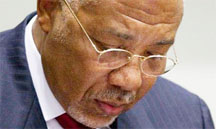THE HAGUE, (Reuters) – Former Liberian President Charles Taylor was jailed for 50 years yesterday for helping Sierra Leonean rebels commit what a court in The Hague called some of the worst war crimes in history.

Taylor, 64, was the first head of state convicted by an international court since the trials of Nazis after World War Two and the sentence set a precedent for the emerging system of international justice. In an 11-year war that ended in 2002, Sierra Leone’s Revolutionary United Front rebels murdered, raped and mutilated their way across Liberia’s West African neighbour, helped by Taylor as he profited from a trade in so-called blood diamonds.
“He was found responsible for aiding and abetting some of the most heinous and brutal crimes in recorded history,” said the Special Court for Sierra Leone’s presiding judge Richard Lussick, emphasising that the world was “entering a new era of accountability.”
Although shorter than the 80 years that prosecutors had sought, the sentence set a precedent for an international justice system aimed at deterring future war crimes. The court rejected defence appeals for leniency.
“It is really significant that Taylor’s status as a former head of state was taken as an aggravating factor as far as his sentence was concerned,” said Geraldine Mattioli-Zeltner of Human Rights Watch.
“That is a very important precedent and I hope that Syria’s Bashar al-Assad and Sudan’s Omar Hassan al-Bashir take note.”
Accused of genocide in Darfur, Sudan’s President Bashir is wanted by the International Criminal Court. The court will soon start the trial of Ivory Coast’s ex-president, Laurent Gbagbo. President Assad does not currently face charges over the bloody suppression of an uprising.
Dressed in a blue suit and yellow tie, Taylor sat impassively through the roughly 45-minute sentencing.
IMPASSIVE
Hands clasped in front of his mouth and brow furrowed, Taylor shifted uneasily when the camera broadcasting proceedings settled on him.
For Edward Conteh, a Sierra Leonean whose left arm was hacked off by the rebels, the sentence was welcome.
“Taylor is now 64 years old, I know that he cannot do 50 years in prison, so I’m satisfied,” Conteh said in the muggy and dilapidated capital, Freetown, scene of mass amputations during some of the heaviest fighting of the war.
Sierra Leone’s average life expectancy dipped to 37 years during the war, in which an estimated 50,000 people were killed.
Lussick described some of the most hideous atrocities: the amputations of limbs which became a hallmark of the conflict, the gang rape victim whose eyes were torn out so she could not identify the perpetrators, the mother forced to carry a bag of human heads – including those of her children.
“She was forced to laugh while carrying the bag dripping with blood,” he said. “She saw the heads of her children.”
Taylor is due to serve his sentence at a high security prison in Britain. The six years he spent detained during the trial will count against his term.
UNCERTAIN
IMPACT
The lawyer who led Taylor’s defence said that rather than promoting international justice, the sentence would only encourage embattled leaders to fight to the end rather than give in and face possible trial.
Taylor stepped down as Liberian president under a peace deal in 2003 when rebels overran his capital, Monrovia.
“Not even the fact that he stepped down to save lives in Liberia was accepted as a mitigating factor. What kind of a message does that send to President Assad?” Courtenay Griffiths said.
In Monrovia, the Taylor family called the trial a mockery of justice.
“They did this because America and Britain want to use our resources,” spokesman Sando Johnson said, pointing to recent offshore oil discoveries.
Not all Sierra Leoneans agreed with the sentence either, some arguing that it was not only Taylor to blame for a war in a country that had for decades been as wracked by corruption, tribalism and neglect as any in Africa.
“Let them leave Charles Taylor free, God will judge him,” said John Kamara, a 31-year-old motor parts dealer.
The defence said it would appeal against the sentence. Its focus is on payments the prosecution made to its witnesses, which it said were prejudicial. Chief prosecutor Brenda Hollis says all payments were disclosed to the court and were legitimate expenses.
The prosecution could appeal to seek Taylor’s conviction for direct criminal involvement, a more serious crime.




